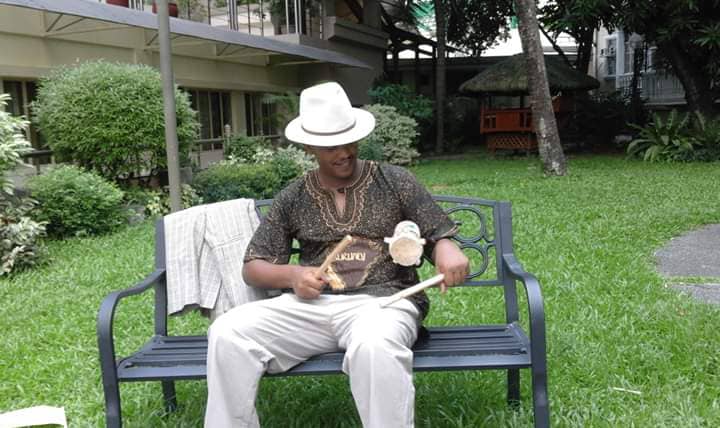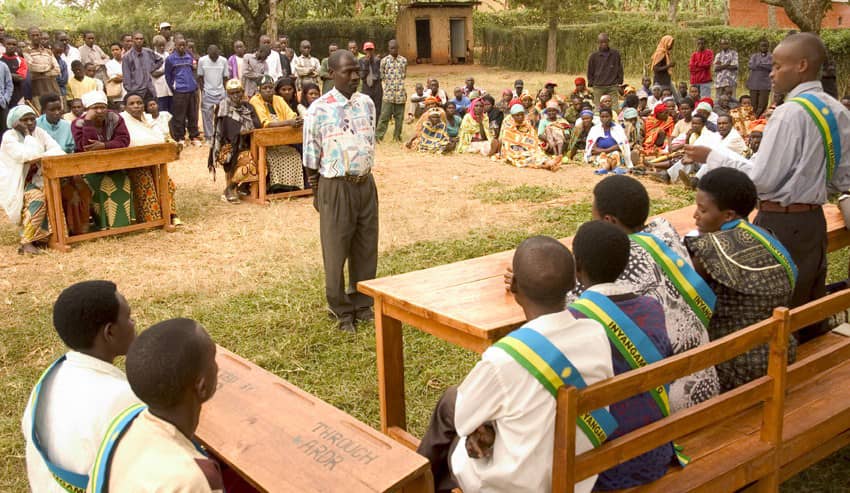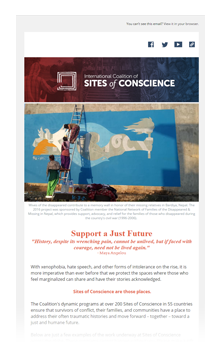
Established in October 2017 by Burundian refugees living in Rwanda, Site of Conscience Forum for Vigilant Memory (FVM) works to educate people about genocide, assist survivors and victims of this crime against humanity, and halt the spread of genocidal ideology in Rwanda. In the aftermath of the attack of the U.S. Capitol in January 2021, the International Coalition of Sites of Conscience spoke to Godefroid Sindayigaya, FVM’s Director of Peace Studies and Leadership, about Rwanda’s approach to accountability and healing, and his thoughts on what Americans next steps should be.
Pour lire cette interview en français, cliquez ici.
1. In 1994, division and polarization reached an unimaginable peak in Rwanda when 800,000 Tutsis and Hutu moderates were murdered in the span of 100 days. At Forum pour la Mémoire Vigilante, FMV, you work with communities to better understand and halt the spread of such genocidal ideology. What happened in 1994 did not happen overnight. Can you talk about the ways that this ideology seeps into a culture over years?
Until the beginning of the 20th century, ethnic identity was generally not a primary or defining characteristic among Rwandans. Colonization changed that. In the case of Rwanda, first German and then Belgian colonizers had a “divide and conquer” mentality. In 1931, for instance, the Belgian government introduced the National Identity Card which labeled each Rwandan as either Hutu, Tutsi, or Twa. Over time, social unity weakened and the idea took hold that Hutus, the majority, were the true Rwandans, while the Tutsi, a minority, were essentially foreigners from North Eastern Africa. From 1959-1962 – in a sort of precursor to the 1994 genocide – over 300,000 Tutsis were forced to flee Hutu violence and resettle in neighboring countries like Uganda, Burundi, Tanzania, and Congo. In the decades that followed, many sought to return to Rwanda, but were told by Rwanda’s government that the “glass was already full.” The government also fueled genocidal ideology during that time, outwardly calling Tutsis “cockroaches” and saying that extermination was the only solution. When, in 1990, a Tutsi-led party, entitled the Rwandan Patriotic Front (RPF), led a democratic rebellion, tensions hit a breaking point and extremist Hutus eventually maneuvered the historic genocide of 800,000 Tutsis and moderate Hutus who helped them. Eventually the RPF, under the leadership of President Paul Kagame advanced, took control of the capital city Kigali and stopped the genocide, but an incalculable loss had taken place.
2. Authoritarian leaders often use fear and falsehoods to sway people, but how can Sites of Conscience and civil society more generally promote individual agency and a respect for human rights? Particularly in repressive settings?
First, people must understand their rights, particularly their right to freedom of expression and their right to vote. So many things blossom from that. In Africa, many people do not know that expressing one’s opinion is a human right. Not surprisingly, the illiteracy rate in Africa is the highest in the world. Authoritarian leaders use this situation to maintain their power. Educate people about their rights and the importance of voting, however, and they will know that changing their country is in their power because denouncing human rights violations and acting to address them is within their rights. Special measures need to be made to encourage women’s empowerment because they have been left behind in so many contexts. But women are essential; many have already honed their leadership skills in the community, and simply need encouragement to join political parties – lead them even – and influence the men in their lives. In every autocrat’s house, there is a woman!
Sites of Conscience can also work to disseminate this information in communities and bring people together so they don’t feel so alone in their activism. There is strength in numbers. Sites of Conscience and other human rights organizations can also take a lead in recording human rights abuses. There have been many human rights violations that have been kept secret for a long time in Africa, as elsewhere. This has resulted in a culture of impunity in many countries. Documenting and sharing information about abuses – particularly when done by local activists and journalists – is one way to fight back. Sites of Conscience can also help educate police, military and civil servants about respecting human rights and how they are accountable to the people.
3. Rwanda has come a long way in healing divisions between Tutsis and Hutus. Can you talk about how that has happened, and what still needs improvement? What is the role of accountability in these processes? How does a country heal on both personal and institutional levels?

Fear of revenge and further division was a huge concern right after the genocide, but luckily significant steps have been made to foster healing and reconciliation instead. While high-level perpetrators were tried in the International Criminal Tribunal in Tanzania, the government established a community-based court system called Gacaca to help ordinary Rwandans recover. In many cases, everyday people who committed genocide were encouraged to acknowledge their wrongs and ask for forgiveness. Peace villages were established where both ethic groups lived side by side. Dialogue programs between Hutus and Tutsis were created. These programs helped fuel a national conversation about the importance of love and forgiveness which is complicated, but ultimately, in my view, necessary for healing and reconciliation. There is still work to be done, of course. There are opponents and activists whose views are not always listened to enough by the government, which will need to happen for lasting peace to take hold. Accountability after the genocide in general, however, has been of tremendous importance. At their best accountability mechanisms help leaders to listen to people and understand their needs, and inspire society to work together for the common good for now and for future generations.
4. What advice would you give Sites of Conscience in the United States that are focused on overcoming the divisive and polarized climate of the last four years?
While I’m not an expert in American culture, from what I hear and see on the news, I believe Sites of Conscience could be beneficial by initiating and promoting social dialogue among Americans at different levels and contexts. These would be about the very problem the country is facing today: division. What, they might ask, unites us as Americans? What divides us? What accountability measures do we need to get to a place where we can begin to feel love for one another again and acknowledge our shared humanity? I think Americans of all types – Democrats, Republicans, whites, Blacks, Indians – are one people in one country, so getting them to talk about their common values and shared points of pride would be a good start.

